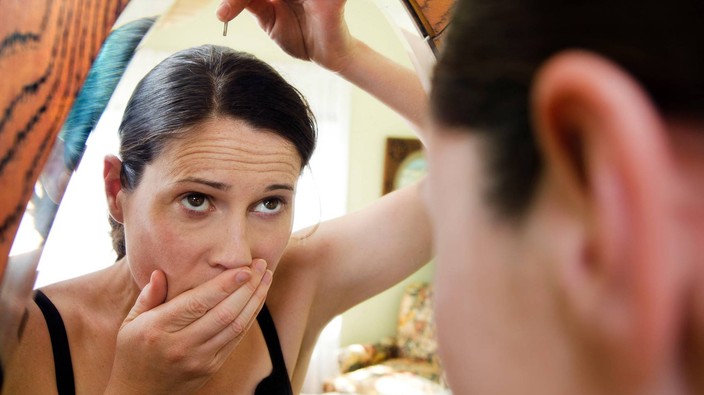science has confirmed what parents have known for decades: stress really does give you grey hair.but the study,
published this week in elife, found the effect is often temporary and hair can return to its natural colour once stress has been eliminated. in addition to settling age-old arguments, the research offers vital information about the processes of aging and, tantalizingly, how to slow or even reverse the hands of time.“understanding the mechanisms that allow ‘old’ grey hairs to return to their ‘young’ pigmented states could yield new clues about the malleability of human aging in general and how it is influenced by stress,”
said martin picard, senior author of the study and an associate professor of behavioural medicine (psychiatry and neurology) at columbia university vagelos college of physicians and surgeons. “our data add to a growing body of evidence demonstrating that human aging is not a linear, fixed biological process but may, at least in part, be halted or even temporarily reversed.”conventional wisdom has long attributed the arrival of grey hair to the stresses of life, but researchers have struggled to unlock the mysteries contained within a single stand.“just as the rings in a tree trunk hold information about past decades in the life of a tree, our hair contains information about our biological history,” picard said. “when hairs are still under the skin as follicles, they are subject to the influence of stress hormones and other things happening in our mind and body. once hairs grow out of the scalp, they harden and permanently crystallize these exposures into a stable form.”using a new method to capture high resolution images — developed by the study’s first author, ayelet rosenberg — researchers were able to examine slices of hair just 1/20
th of a millimetre in size that would have taken an hour to grow on a human head.“if you use your eyes to look at a hair, it will seem like it’s the same colour throughout unless there is a major transition,” picard said. “under a high-resolution scanner, you see small, subtle variations in colour, and that’s what we’re measuring.”by comparing the minute hair fragments of 14 volunteers to a stress diary they were required to keep, researchers found ample evidence connecting stress to the greying of hair and, in some cases, to the hair returning to its natural colour — a process that has not been quantitatively documented in the past. “there was one individual who went on vacation and five hairs on that person’s head reverted back to dark during the vacation, synchronized in time,” picard said.
by analyzing the thousands of proteins contained in a strand of hair — and how they fluctuate along its length — researchers discovered 300 different proteins are involved in the colour change. a mathematical model designed by the team laid the blame for the change on the mitochondria.“we often hear that the mitochondria are the powerhouses of the cell, but that’s not the only role they play,” picard said. “mitochondria are actually like little antennas inside the cell that respond to a number of different signals, including psychological stress.”the findings differ from research conducted on mice that pinned stress-induced greying on an irreversible loss of stem cells inside hair follicles. “our data show that greying is reversible in people, which implicates a different mechanism,” said ralf paus, co-author of the study and a professor of dermatology at the university of miami miller school of medicine. “mice have very different hair follicle biology and this may be an instance where findings in mice don’t translate well to people.”while any effort to decrease the stresses of life is a good thing, researchers warn the salt and pepper look isn’t so easy to shake. “based on our mathematical modeling, we think hair needs to reach a threshold before it turns grey,” picard said. “in middle age, when the hair is near that threshold because of biological age and other factors, stress will push it over the threshold and it transitions to grey.“but we don’t think that reducing stress in a 70-year-old who’s been grey for years will darken their hair or increasing stress in a 10-year-old will be enough to tip their hair over the grey threshold.”
dave yasvinski is a writer with healthing.ca
 3 minute read
3 minute read









